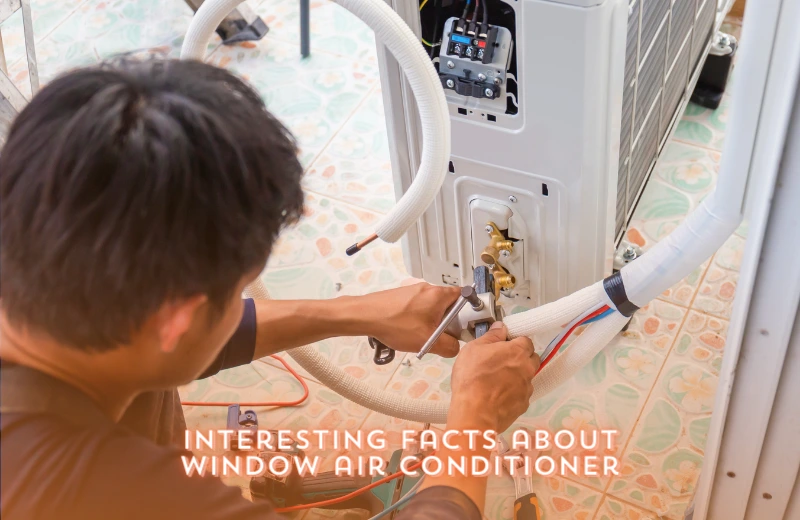On sweltering days, the very last thing one desires is for their abode to mimic a steam room.
So, you crank up the air conditioner and hope for relief.
But as the cool air blasts out of the window unit, you may notice that something’s not quite right.
Do Window Air Conditioners Ruin Windows?

While concerns over window units damaging window panes are understandable, the truth about such air conditioners’ effects proves less threatening upon closer examination.
In most cases, damage from AC units is minor and can be easily fixed.
Through consistent upkeep, one can maintain their windows in fine form and delight in pleasant indoor conditions throughout the warm season.
If you’re considering purchasing a window air conditioner, you may be wondering if it will ruin your windows.
The short answer is no, window air conditioners do not typically ruin windows.
While potential risks exist with installation, being cognizant of several issues upfront can help ensure a smooth process.
A potential concern arises if the unit’s weight were to gradually pull downward on the window frame as time passes, especially where older windows or those in need of repair have not been properly cared for and could be more vulnerable to sagging from the strain.
To avoid this, choose a unit that matches your window’s size and check the weight rating to ensure it won’t cause damage.
Another concern is moisture buildup around the unit, which can lead to mold or mildew growth.
Regular cleaning and maintenance can prevent this issue, especially in humid climates.
Do Window Air Conditioners Need to Be Removed in Winter?
It’s a common misconception that window air conditioners need to be removed in winter. While protecting your unit from the cold is essential, removing it altogether might not be necessary.
Here are some recommendations for maintaining your window air conditioner in proper working condition during the colder months which could prove useful:
Cover the unit:
Use a tarp or plastic sheet to shield it from snow and ice.
Store indoors:
Store indoors if possible. Further protect it from the elements.
Keep it clean:
Remove debris for optimal performance come summer.
Should Windows Be Closed for Air Conditioning?
While commonly thought otherwise, keeping windows shut when running air conditioning may not prove the optimum approach.
Keeping windows closed traps cold air inside, forcing your AC to work harder and raising your energy bill. It can also lead to condensation on windows, promoting mold and mildew growth.
To keep your home cool and save on energy costs, it’s advisable to keep windows open when using air conditioning.
What is a Common Problem With Window Air Conditioning Units?
If your window air conditioner isn’t working correctly, there are a few things to check before calling a repairman.
Ensure the unit is plugged in, the circuit breaker hasn’t tripped, and there’s a green light indicating power.
Frozen units are common issues caused by dirty filters or poorly maintained coils.
Regularly clean or replace the filter and vacuum dust off the coils to avoid problems.
Is It Better to Have Windows Open or AC On?
The decision to open windows or turn on the air conditioning depends on the outside temperature.
If it’s cooler outside, opening windows can save energy and improve indoor air quality.
If it’s hotter outside, using AC helps maintain a comfortable temperature while filtering out pollutants and allergens.
Best Position for Window Type Air Conditioner in Bedroom
Placing a window air conditioner in the bedroom requires careful consideration.
Avoid obstructing airflow by not placing it directly behind or in front of furniture.
Position the unit to blow air across the room, maintain a suitable height (around waist level), and allow enough space around it for proper ventilation.
Air Conditioners Should Be Installed at the Top Windows: Why?
While window-mounted air conditioners may generate unwanted sound and detract from aesthetics, placing them near the top of windows could help address such issues and merit further review.
This configuration possesses several advantages, such as lowering audible disturbances while enhancing steadiness and rendering a lower observable profile.
However, ensure proper ventilation and secure installation to prevent damage or injury.
AC Doesn’t Fit in Window
If your window air conditioner doesn’t fit, there are solutions.
Use an AC adapter kit for sliding windows, or use duct tape to secure the unit. Weatherstripping can help seal gaps around the unit.
How to Ruin a Window Air Conditioner?
While window air conditioners are generally durable, neglecting maintenance can lead to issues. Here’s how to ruin a window air conditioner:
Don’t clean or maintain it
Accumulated dirt reduces efficiency and increases breakdown likelihood.
Use it constantly without breaks
Running 24/7 shortens lifespan and increases repair needs.
Turn up the thermostat too high
Strains the unit, leading to premature wear and tear.
Also, block airflow around the unit Impairs efficiency and performance.
Conclusion
While window air conditioners can potentially cause damage, it’s usually minor and preventable.
Regular maintenance and smart usage can keep your windows intact and your indoor temperatures comfortable.
So, before you worry about your AC unit ruining your windows, remember that a little care goes a long way.